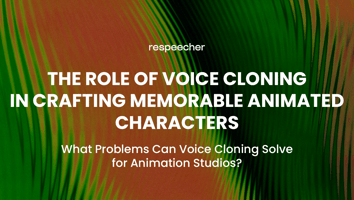The Role of AI Voice Cloning in Virtual Reality and Immersive Environments
Apr 11, 2024 11:15:44 AM

Virtual reality environments are like magic, transporting people to fantastical realms or simulated real-world scenarios. They hold immense potential for entertainment, education, training, and therapeutic purposes. For VR, it’s essential to provide users with experiences that are not only visually stimulating but also deeply interactive and engaging.
One key factor contributing to the success of immersive VR environments is the integration of realistic and interactive elements. AI voice cloning is a cutting-edge technology that leverages advanced machine learning algorithms to analyze and replicate the nuances of human speech, enabling virtual characters to converse with users in a manner that is indistinguishable from real human interaction. This technology promises unparalleled authenticity and personalization, as virtual characters can now possess unique voices that reflect their personalities, backgrounds, and emotions.
Understanding AI Voice Cloning in VR
AI voice cloning is a revolutionary technology based on artificial intelligence. It uses advanced algorithms to replicate human speech patterns and vocal characteristics. The technology uses deep learning techniques, particularly neural networks, which analyze and synthesize audio data. The process involves two stages: training and inference.
During training, the AI model is fed large datasets of recorded human speech samples. These samples encompass a diverse range of voices, accents, intonations, and emotions, enabling the model to learn the intricacies of human speech. The neural network identifies patterns and correlations within the data through iterative training, gradually refining its ability to mimic natural speech.
Once the model has been sufficiently trained, it enters the inference phase, generating new audio samples based on input text or phonetic sequences. By leveraging the knowledge acquired during training, the model synthesizes speech that closely resembles the characteristics of the voices it has been exposed to.
Integrating AI voice cloning in virtual reality introduces a new dimension of realism and interactivity to virtual environments. Developers can create immersive environments where users engage in natural, fluid conversations with AI-driven NPCs by imbuing virtual characters with lifelike voices. These virtual characters can respond dynamically to user inputs, adapting their speech patterns and dialogue based on contextual cues and user interactions.
Applications in Virtual Reality and gaming
AI voice cloning, facilitated by advanced Text-to-Speech (TTS) technology, is pivotal in enhancing the realism and responsiveness of VR environments across gaming, education, and simulation applications.
In VR gaming, AI voice cloning enables developers to create dynamic and interactive narratives where characters respond to player actions in real time with lifelike speech. By leveraging voice cloning techniques, VR games can offer personalized and immersive experiences that adapt to the player's choices and interactions.
One notable example of AI voice cloning in VR gaming is the critically acclaimed "God of War Ragnarok," released in November 2022. In the game's credits, Respeecher's pioneering work in AI-generated voices is acknowledged for contributing to enhancing the game's audio experience. Through AI voice cloning, "God of War Ragnarok" delivers rich, dynamic dialogue that breathes life into its characters, deepening the player's engagement with the narrative.
Additionally, AI voice cloning has been instrumental in addressing challenges related to voice acting in gaming, such as replacing deceased voice actors or providing multilingual support. "Cyberpunk 2077," a highly anticipated title, utilizes Respeecher AI technology to seamlessly replace the voice of a deceased actor, ensuring continuity and authenticity in the game's audio dialogue.
Beyond AI in gaming, AI generated voices are transforming educational simulations and training programs in VR experience. By incorporating realistic voice interactions, VR simulations can simulate real-world scenarios and provide learners with immersive, hands-on experiences. From language learning apps to medical training simulations, AI voice cloning enhances the effectiveness of VR-based educational content, making learning more engaging and accessible.
Personalization and user interaction
Through AI voice cloning, users can project their own voices onto digital avatars or select from diverse voices to embody their characters. This level of customization not only enhances immersion but also fosters deeper emotional connections between users and their virtual personas.
By seamlessly integrating their natural speech patterns and accents into their virtual counterparts, users can personalize their avatars to reflect their personalities and preferences. By selecting a voice that resonates with them, users can tailor their interactive VR experience to suit their preferences and create more authentic interactions.
Use cases for voice cloning in VR environments:
- Virtual Training and Education: Voice cloning enables the creation of lifelike virtual tutors and instructors in educational VR applications.
- Interactive Storytelling: VR storytelling experiences can leverage AI voice cloning to bring characters to life with natural and expressive dialogue.
- NPCs: Voice cloning technology can be used to populate VR environments with interactive non-player characters (NPCs)
- Virtual Social Interactions: In social VR platforms and multiplayer games, voice cloning enables users to communicate with each other using lifelike voices.
In general, personalized voice interactions contribute to heightened immersion within VR environments, as users feel more connected to their personalized avatars and the world around them.
- Emotional Connection: The ability to project one's own voice or choose from a range of voices for virtual characters fosters emotional connections between users and their avatars. Also, voice AI cloning empowers users to customize their virtual experience according to their preferences, giving them a greater sense of agency and control over their virtual interactions.
Challenges and Ethical Considerations
One of the primary ethical concerns surrounding AI voice cloning is the issue of consent and privacy. Generating lifelike voices from publicly available data or recordings without individuals' explicit consent raises questions about privacy rights and the potential misuse of personal data.
Developers are implementing measures to ensure transparency and disclosure regarding AI voice cloning technology and speech synthesis. This includes informing users about collecting and processing their voice data and obtaining explicit consent before generating or using their voices in virtual environments. They also prioritize data security and privacy protection by implementing robust encryption and secure storage practices to safeguard voice data from unauthorized access or misuse in their AI ethics.
Meanwhile, industry organizations and regulatory bodies are establishing ethical guidelines and standards for the responsible development and deployment of AI voice cloning technology. These guidelines emphasize user consent, data privacy, and fairness in AI-driven interactions. Find out more from our Ethics page.
The future of AI voice cloning in VR
As technology advances, several key developments and emerging trends are poised to shape the evolution of AI voice cloning and its integration into VR environments. Future iterations of AI voice cloning will likely incorporate emotional intelligence, enabling virtual characters to express a broader range of emotions and respond empathetically to users' feelings. By analyzing contextual cues and user interactions, AI-driven voices can convey subtle nuances of emotion, enhancing the realism and depth of virtual interactions. This integration of emotional intelligence will contribute to more immersive storytelling experiences, where users forge deeper emotional connections with virtual characters.
The convergence of AI voice cloning with other AI technologies, such as natural language processing and machine learning, will pave the way for creating fully interactive, AI-driven virtual worlds. These dynamic environments will feature intelligent NPCs, virtual assistants, and interactive elements that adapt and respond intelligently to user inputs. Users can engage in natural, fluid conversations with AI-driven characters, influence the course of narratives, and shape the virtual world according to their actions and choices.
Conclusion
By seamlessly replicating human speech patterns and vocal characteristics, AI voice cloning adds layers of realism, authenticity, and personalization to virtual experiences. Users can project their own voices onto virtual avatars, choose from a range of voices for their characters, or engage in natural, fluid conversations with AI-driven NPCs. This level of customization and interactivity fosters deeper emotional connections, enhances immersion, and empowers users with greater agency and control over their virtual interactions.
Developers, creators, and users alike should embrace the transformative potential of AI voice cloning and explore its possibilities for enhancing virtual experiences. By leveraging Respeecher AI technology responsibly and ethically, we can unlock new frontiers of immersion, personalization, and engagement in virtual reality.

Rustem Vilenkin
Business Development Executive
Rustem's focus is on forging new business relationships and developing strategies that enhance market presence. His expertise in business development is complemented by his keen understanding of the voice AI sector, enabling him to effectively align Respeecher's innovative solutions with client needs and industry trends.



